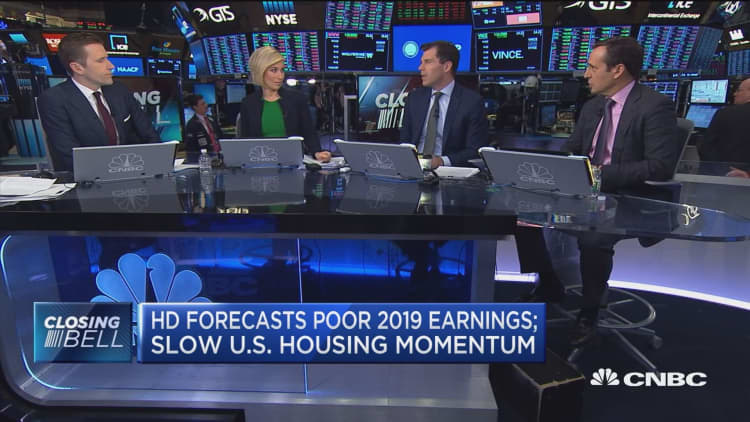
Stocks fell in choppy trading Tuesday as investors digested the release of weaker-than-expected Home Depot earnings, mixed economic data and testimony from the top-ranked Federal Reserve official.
The Dow Jones Industrial Average dipped 33.97 points to 26,057.98 as Caterpillar and Home Depot underperformed. The pulled back 0.1 percent to close at 2,793.49 as losses in the industrials sector offset a gain in tech. The Nasdaq Composite closed 0.07 percent lower at 7,549.30. The major indexes alternated between gains and losses for most of the session.
Home Depot reported adjusted fourth-quarter earnings of $2.09 a share, below an expected profit of $2.16. The home improvement company also issued weaker-than-expected guidance for 2019. Those results sent Home Depot shares down about 0.88 percent.
Home Depot's results were followed by weaker-than-expected housing starts data. Data released by the Commerce Department showed housing starts fell 11.2 percent in December and reached their lowest level since September 2016.
The data are old and "not reflecting enough time for consumers to respond to lower mortgage rates," said Peter Boockvar, chief investment officer at Bleakley Advisory Group. "That said, the weekly MBA data on purchases has shown no real rebound in response to lower mortgage rates."
Home prices also rose in December at their slowest pace August 2015, the S&P Case-Shiller index showed.
Strong consumer confidence numbers helped equities recover some of their losses. The Conference Board said its consumer confidence index surged to 131.4 in February, easily topping an estimate of 124. In January, consumer confidence was at 121.7.
Market participants also digested testimony from Federal Reserve Chairman Jerome Powell to a U.S. Senate committee on Tuesday. In prepared remarks, Powell said the economy is "healthy" but added the Fed is also seeing "crosscurrents and conflicting signals." It comes after the U.S. central bank adopted a more cautious stance on future interest rate hikes last month.
Powell's testimony came after Fed Vice Chair Richard Clarida said late Monday that the U.S. economy is "in a good place right now. He added: "It's a good situation to be in, and we really want to do whatever we can to help support and maintain the economy."
Stocks have been on a tear recently, with the Dow and Nasdaq on a nine-week winning streak. The S&P 500 has risen for eight of the past nine weeks. Diminishing concerns over U.S.-China trade and tighter monetary policy have contributed to the sharp stock gains.
Dan McMahon, director of equity trading at Raymond James, thinks equities have more room to run higher.
"We are still very much of the mind we are in a secular bull market. The run-off from the December lows is not too much too soon," McMahon said. "From a valuation standpoint, everything looks OK. There's still a lot of cash on the sidelines.Things aren't that bad. You've got all kinds of headwinds and the market keeps charging ahead."
Caterpillar dropped 2.4 percent after UBS cut its rating on the industrial giant to sell from buy. UBS also slashed its 12-month price target on Caterpillar to $125 per share from $154, implying an 11.6 percent downside from Monday's close of $141.41. UBS cited slowing demand in global construction as the main reason for the downgrade. Caterpillar is largely seen as a bellwether for global growth.
—CNBC's Sam Meredith and Reuters contributed to this report.


